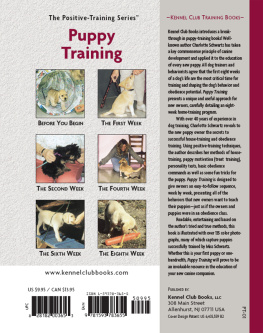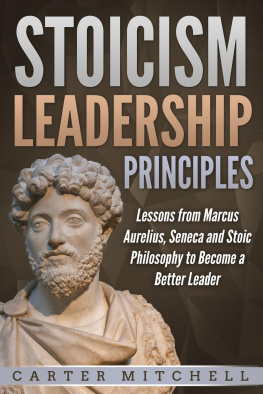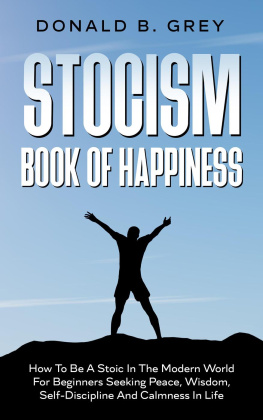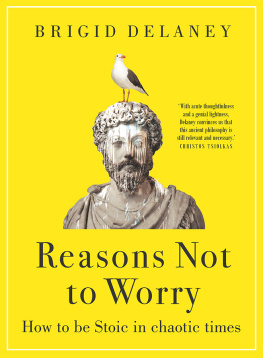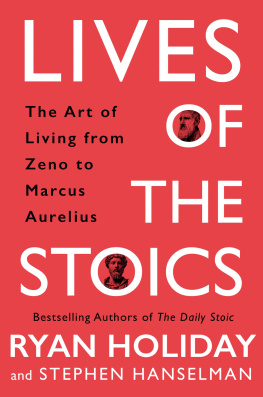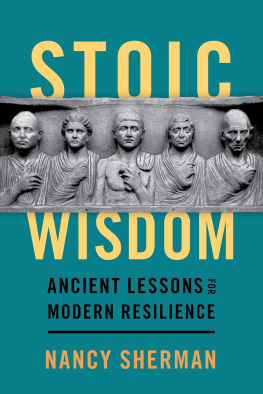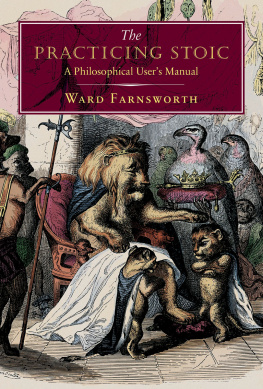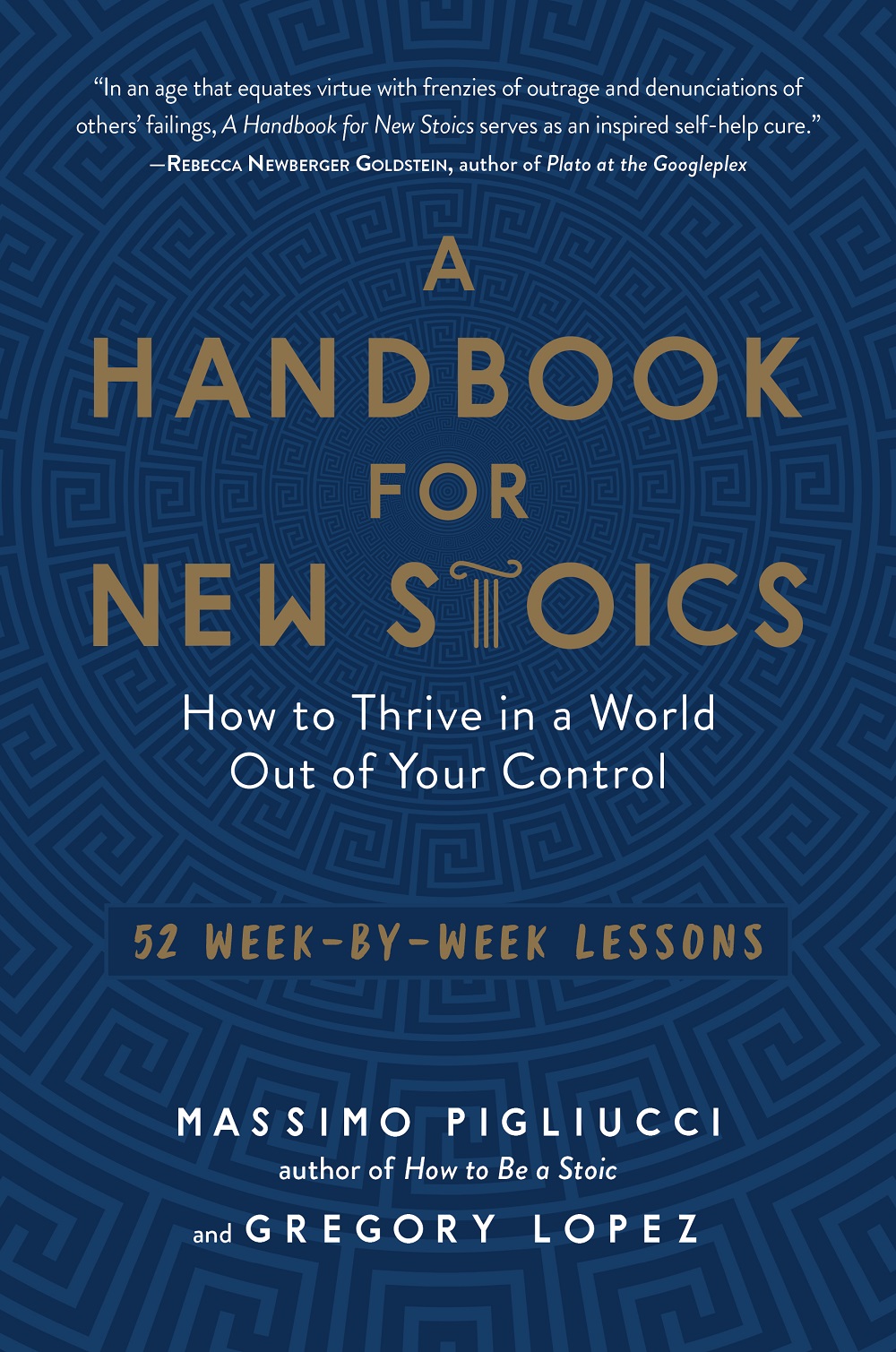
Acclaim for
A Handbook for New Stoics
In 52 pithy and practicable lessons, Pigliucci and Lopez explain how lessons plucked from an ancient Greco-Roman philosophy can reshape ones sense of self....This successful blend of knowledge and action items will entice readers looking for thoughtful prompts for self-reflection.
Publishers Weekly
In an age that equates virtue with frenzies of outrage and denunciations of others failings, A Handbook for New Stoics serves as an inspired self-help cure that, with insight and sympathy, will nudge you in the direction of the happiness and equanimity born of strength of character and wisdom.
Rebecca Newberger Goldstein, author of Plato at the Googleplex
and National Humanities Medal recipient
A wonderfully simple approach to the core concepts and techniques of Stoicism, A Handbook for New Stoics gives readers an easy way to train themselves in Stoic practices, broken down into weekly exercises spanning a whole year. Through this book, Pigliucci and Lopez have managed to make Stoicism accessible to anyone.
Donald Robertson, cognitive behavioral psychotherapist
and author of How to Think Like a Roman Emperor
A wonderful and potentially life-altering way to encounter the wisdom of the Stoics, A Handbook for New Stoics provides readers with structured lessons and exercises to explore Stoic philosophy alongside the lives they, themselves, are living.
Professor William B. Irvine, author of A Guide to the Good Life
In this book, Pigliucci and Lopez offer a great hands-on introduction to Stoic philosophy and practice while also providing valuable ideas for long-time students of Stoicism. Well-researched and carefully structured, with practical exercises that complement ancient texts, A Handbook for New Stoics will guide you through Stoic practice step-by-step throughout the year.
Gregory Sadler, editor of Stoicism Today
Also by Massimo Pigliucci
How to Be a Stoic:
Using Ancient Philosophy to Live a Modern Life
Answers for Aristotle:
How Science and Philosophy Can Lead Us to a More Meaningful Life
Nonsense on Stilts:
How to Tell Science from Bunk
Making Sense of Evolution:
The Conceptual Foundations of Evolutionary Biology
with Jonathan Kaplan
Denying Evolution:
Creationism, Scientism, and the Nature of Science
Phenotypic Plasticity:
Beyond Nature and Nurture
Phenotypic Evolution:
A Reaction Norm Perspective
with Carl D. Schlichting
A HANDBOOK FOR NEW STOICS: How to Thrive in a World Out of Your Control
Copyright 2019 by Massimo Pigliucci and Gregory Lopez
All rights reserved. Except for brief passages quoted in newspaper, magazine, radio, television, or online reviews, no portion of this book may be reproduced, distributed, or transmitted in any form or by any means, electronic or mechanical, including photocopying, recording, or information storage or retrieval system, without the prior written permission of the publisher.
The Experiment, LLC
220 East 23rd Street, Suite 600
New York, NY 10010-4658
theexperimentpublishing.com
Many of the designations used by manufacturers and sellers to distinguish their products are claimed as trademarks. Where those designations appear in this book and The Experiment was aware of a trademark claim, the designations have been capitalized.
The Experiments books are available at special discounts when purchased in bulk for premiums and sales promotions as well as for fund-raising or educational use. For details, contact us at .
Library of Congress Cataloging-in-Publication Data
Names: Lopez, Gregory, author. | Pigliucci, Massimo, 1964- author.
Title: A handbook for new Stoics : how to thrive in a world out of your
control : 52 week-by-week lessons / Massimo Pigliucci, Gregory Lopez.
Description: New York : Experiment, 2019. | Includes bibliographical
references.
Identifiers: LCCN 2018053814 (print) | LCCN 2019001296 (ebook) | ISBN
9781615195343 (ebook) | ISBN 9781615195336 (flexibind)
Subjects: LCSH: Stoics.
Classification: LCC B528 (ebook) | LCC B528 .P529 2019 (print) | DDC 188--dc23 LC record available at https://lccn.loc.gov/2018053814
ISBN 978-1-61519-533-6
Ebook ISBN 978-1-61519-534-3
Cover and text design by Beth Bugler
Author photographs by Simon Wardenier (Massimo Pigliucci) and T. Kogan (Gregory Lopez)
Manufactured in China
First printing May 2019
10 9 8 7 6 5 4 3 2 1
CONTENTS
Part 1: 17 Lessons in
the Discipline
of Desire | Part 2: 18 Lessons in
the Discipline
of Action | Part 3: 17 Lessons in
the Discipline
of Assent |
|
|
|
|
|
|
|
|
|
|
|
|
|
|
|
|
|
|
|
|
|
|
|
|
|
|
|
|
|
|
|
|
|
|
|
|
|
|
|
|
|
|
|
|
|
|
|
|
introduction
GETTING STARTED
MIKES TWENTY-FIVE-YEAR COLLEGE REUNION was supposed to be fun. Instead, it has turned into an exercise in inadequacy. His classmates Aziz and Saliah are still together, ever since their first date during sophomore year; Mikes marriage lasted less than five years, leading to financial trouble and an insecurity about romantic relationships that persists to this day. Steve, Mikes former roommate, has maintained his athletic physique while Mikes potbelly has only grown, a charming accompaniment to his thinning hair. And his roommates business major propelled him to the C-suite, while Mike has stagnated in middle management of a company whose products he doesnt even believe in. Everywhere he looks, Mike sees success, but when he faces himself in the bathroom mirror after the cocktail hour, he cant help but feel like a failure. No wonder Im unhappy, he thinks. Its because my life is bad. Everything is awful.
The Best Bet for Happiness
There are many things that we want and events we want to happen. We want to lose weight, get a raise, be liked by the people around us. Yet for many of us, including Mike, these desires never materialize, and were left feeling inadequate, frustrated, and stuck. And it can get worsefor all of us. Things we specifically dont want actually do happen, ranging from trivialities (getting stuck in traffic) to more serious events (illness and aging). Getting what we dont want can be just as painful as not getting what we do want, and often more so. However painful this is, we keep on placing the same bad bets, staking our happiness and well-being on things outside our control through a cosmic roll of the dice.
What if we were able to train ourselves to desire only things that are firmly within our control? Then, in a very real sense, wed always get what we want, and never get what we dont want. Our happiness would never spill, since the cup of our desires is reliable and holds firm.
Next page

